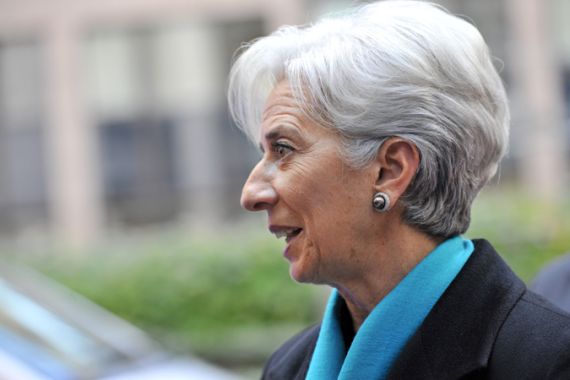Eurozone leaders seek deal on Greek crisis
EU ministers are meeting in Brussels for third time to secure debt deal that will prevent imminent bankruptcy of Greece.

Finance ministers from the 17 euro-area member states are in talks to try to seal a deal that will prevent the imminent bankruptcy of Greece.
|
“Greece has delivered, now it’s delivery time for the Euro-group and the IMF“ – Olli Rehn, |
The ministers, meeting on Monday in Brussels, have for weeks failed to agree a strategy that will allow them to release some 44 billion euros ($56.8bn) for the cash-strapped country.
Keep reading
list of 4 itemsWhy are nations racing to buy weapons?
Parallel economy: How Russia is defying the West’s boycott
US House approves aid package worth billions for Ukraine, Israel
It is expected that Greece would receive the money and an extra two years to make the reforms that are a condition of the bailout.
“It is essential to take a decision on the disbursement of the next tranche … in the course of today,” Olli Rehn, EU’s euro commissioner, said on arrival for the third meeting in two weeks on the thorny issue.
“Greece has delivered, now it’s delivery time for the Euro-group and the IMF,” he added.
Christine Lagarde, head of the International Monetary Fund (IMF), said the talks would see all parties “work towards a credible solution for Greece.”
Wolfgang Schaeuble, German finance minister, whose government is one of several creditors opposed to such an approach, said he was “confident we can reach a deal today. We have worked well”.
Domino effect
The IMF has been pushing for a so-called “haircut” or write-down of debt by eurozone partner governments in the way banks wrote off most of the loans owed to them earlier this year.
Greece has been waiting since June for the loan installment, part of a 130-billion-euro ($173bn) rescue granted earlier this year.
In return for its bailout loans, Greece has had to impose several rounds of austerity measures and submit its economy to scrutiny from the so-called troika of the IMF, European Central Bank and European Commission.
Greece’s fortunes are inextricably tied to the rest of the eurozone.
Without the bailout funds that have been keeping it afloat since May 2010, the country would default and could end up having to leave the eurozone. This could have a domino effect on other financially troubled eurozone nations.
Concerns that European finance ministers will again fail to reach an agreement weighed on markets on Monday.
In Europe, the FTSE 100 index of leading British shares was down 0.4 per cent at 5,795 while Germany’s DAX fell 0.2 per cent to 7,291. The CAC-40 in France was 0.6 per cent lower at 3,509.
Interest rates
Al Jazeera’s John Psaropoulos, reporting from Athens, said the interest rates remain central to the talks among the members.
“The discussion has gone into whether the Eurozone can reduce the amount of interest that they are charging Greece. But that interest was already very low,” he said.
“It was 1.5 per cent above what they are paying. They are now talking about reducing it to 0.6 per cent, which is about as low as the hardline members – like Germany – would accept.”
Psaropoulos said another Euro-group meeting was scheduled for next Monday.
“If by then, Greece does not get the money that the Eurozone has promised, having done all the austerity reforms that the Eurozone demanded, the problem Greece will face is political rather than [just] financial,” he said.
“The government opponents here in Athens are going to say: ‘look the Eurozone is no longer creditable on the promises that it has made to Greece’… the government may then be overwhelmed by its enemies here and face existential pressures.“